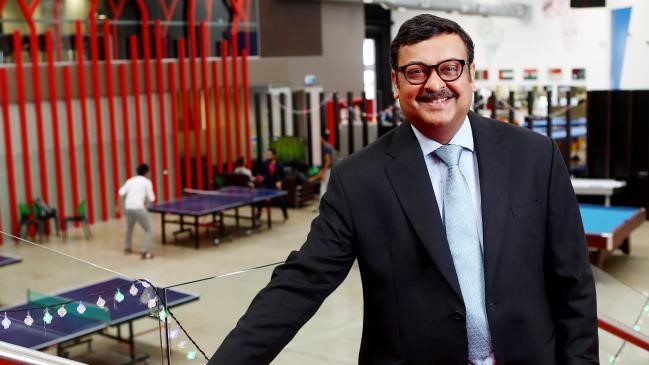Higher education the next target for technology revolution

The revolutionary impact of technology is about to be felt in education says Nitish Jain, owner of a Sydney management school that, in only 13 years, has an MBA degree which consistently scores highly in global rankings.
Mr Jain built his institute, the SP Jain School of Global Management, by offering job-oriented, face-to-face learning which gave business students international experience.
But now he is adjusting his strategy.
His new model is “customised learning”, delivered on a software platform, and the business courses his school teaches will have a very strong technology component.
Mr Jain, who comes from one of India’s richest families, founded the SP Jain school 13 years ago, naming it after his grandfather, the industrialist and philanthropist Shreyans Prasad Jain.
For a small, recently established business school, its MBA ranks highly. It is 46th globally in the Poets & Quants table of non-US MBAs, which is a compilation of the Financial Times, Economist, BusinessWeek and Forbes rankings.
Even though the SP Jain school has campuses in Dubai, Singapore and Mumbai as well as Sydney, and mainly enrols non-Australian students, all its degrees rely on Australia’s Tertiary Education Quality and Standards Agency for their accreditation.
Mr Jain, who is independently wealthy, says he founded his business school because he saw the opportunity to improve business education by offering students direct links with businesses and the experience of learning in different cultures.
His MBA students spend four months in each of the campuses in Sydney, Dubai and Singapore.
“But this is yesterday’s model, now we are looking at taking it further,” he said.
The school is now building a strong technology component — blockchain, artificial intelligence, big data and cyber
security — into all its courses, which include bachelor degrees and short courses as well as the MBA.
“We’ve already set up labs: a blockchain lab and internet of things lab, a machine learning lab,” he said.
He’s doing this because “technology is disrupting business, quicker and faster than anything else we have known in the history of mankind”.
He believes that business managers and entrepreneurs need to know how to apply new technology to business.
Mr Jain also believes technology is rapidly changing the way education is delivered and will greatly reduce the cost. One reason is that online learning material is cheap and much of it is already available.
“We don’t need to create all that content, others are creating it for us. In some cases you pay a licence fee, in some cases you don’t even pay a licence fee,” he said.
“Once you start using technology your costs can be slashed by 50 per cent. Because no matter which industry you talk about, technology only reduces costs.
“I predict that in the next five years we will certainly reduce our fees because we will reduce our costs and we will have computers to do a lot of the heavy lifting.”
Mr Jain also said the teaching style has to change. It can’t be classroom-style teaching implemented online, not can it be exam- oriented.
If you do that, he said, “you’re not playing to the strength of the technology”.
He believes the new style of education has to be “projects-led”.
“What you can do with your learning is more important than repeating what you learnt in the classroom,” he said.
And there needs to be an emphasis on group work so there is social connectedness. “You need like-minded humans.”
SP Jain school already works on a low-cost basis. Its Sydney campus is in a no-frills former warehouse at Sydney’s Olympic Park which has been remodelled as offices, teaching spaces, a student recreation area and cafeteria.
Currently SP Jain school has mostly Indian students, as well as some of other nationalities, but it now intends to compete more aggressively for Australian students, particularly for short courses in business-related technology. In the next six months it wants to begin offering accredited certificates and diplomas.
How did SP Jain rise so rapidly up the MBA ranking scale?
Mr Jain admits he had an advantage. He educated students who started with low Indian and Asian wages but graduated into higher paid, First World jobs.
This meant his students enjoy a big salary boost, which ranking groups treat favourably.
“But that’s our model. I’d like to think of it as a very smart model,” he said.
This story was originally published in The Australian on Wednesday, December 6, 2017.
Magazine Link: http://www.theaustralian.com.au/higher-education
Article Link: http://www.theaustralian.com.au/higher-education/higher-education-the-next-target-for-technology-revolution/news-story/b517904751aa12a8a8ea9aad77dfe146




